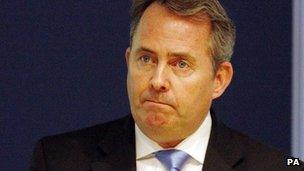Liam Fox raises doubts over regular Army cuts
- Published

Liam Fox resigned as defence secretary in 2011
Plans to recruit more Army reservists might have to be reversed if work commitments mean they are not as easy to deploy at speed as regular soldiers, Liam Fox has said.
The former defence secretary told The House, external magazine there had to be "guarantees that we would be able to get the numbers".
The coalition is taking on 30,000 reservists to cover Army cuts.
The MoD said it was committed to delivering "challenging" targets.
But Mr Fox predicted "constant" manpower challenges.
The North Somerset MP, a former doctor who came third in the 2005 Conservative leadership election, is a popular figure on the right of the party.
He resigned from the cabinet position in October 2011 over his relationship with his friend the lobbyist Adam Werritty.
Last year, he had to repay £3,000 of expenses after it was found he had allowed Mr Werritty to live at his taxpayer-funded second home for a year rent-free.
'New problems'
The government wants to expand the Reserve Force, formerly the Territorial Army, to 30,000 by 2018 to help fill gaps left by cuts to the regular Army. The Army is due to lose 17 major units as it cuts 20,000 regular soldiers by 2020.
Questioned about this, Mr Fox said: "When I was secretary of state, I said we would only decrease the numbers of regulars when we had guarantees that we would be able to get the numbers - training and equipping up of the reserves - to match."
He raised doubts about the feasibility of the project, saying: "It brings with it new problems. If you're going to use reserves instead of regulars and are depending on them, you need to be able to get them when you want them, which is a change in relationships with employers.
"That's something that has to be managed. Otherwise there might be a major disincentive for any employer to take on someone who is in the reserves. All these things will have to be ironed out."
Mr Fox added: "I think we need to keep a constant eye on the number of reservists. Otherwise there will be a risk that we would have to put in to reverse the policy. That's a constant challenge and, of course, as the economy recovers it will become more difficult to recruit and retain.
"There will be challenges on manpower, definitely, throughout this decade, challenges in the balance ahead. We'll have to see how the employment market goes and work accordingly."
'Affordable and sustainable'
A Ministry of Defence spokesman said: "The decision made two years ago to grow the Army Reserve to 30,000 will deliver a fully integrated force of 120,000 made up of regulars and reserves by 2018.
"This is a challenging target, but one we are committed to achieving. As the chief of the defence staff has said, the Army is pulling out all the stops to ensure we deliver this new force.
"These changes will ensure that we have an Army that is affordable and sustainable in the long term. We have just started a sustained recruitment campaign alongside an investment of £1.8bn in training and equipment for the reserves.
"But the Army has to manage its budget and the planned steady reduction in the size of the regular army to its target level, as the reserves build up, is the best way to deliver the required output."
- Published17 October 2013
- Published30 September 2013
- Published6 October 2013